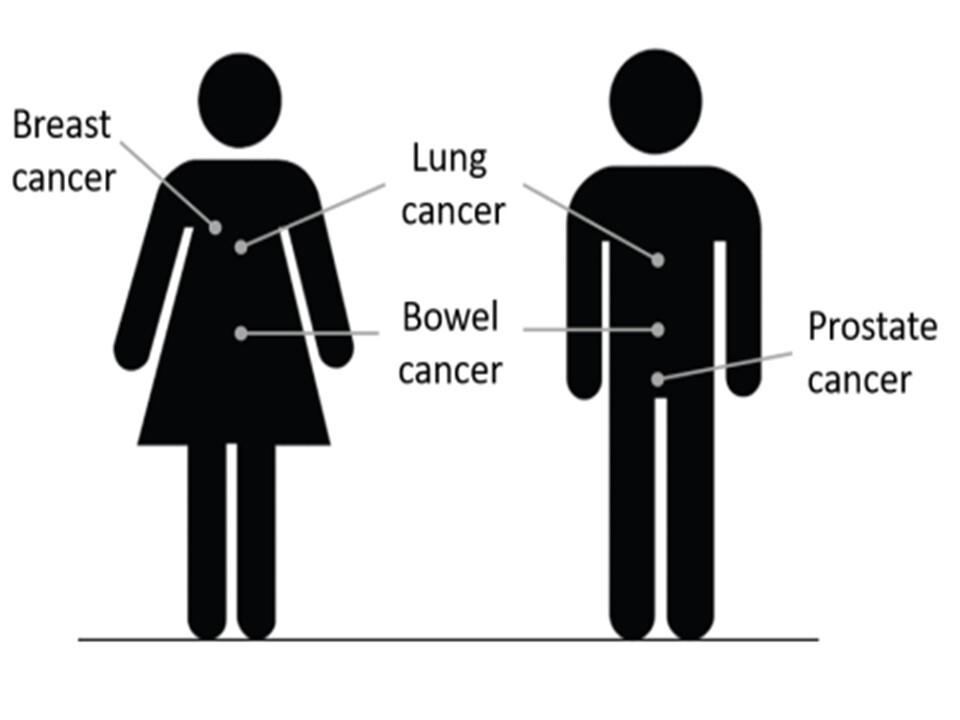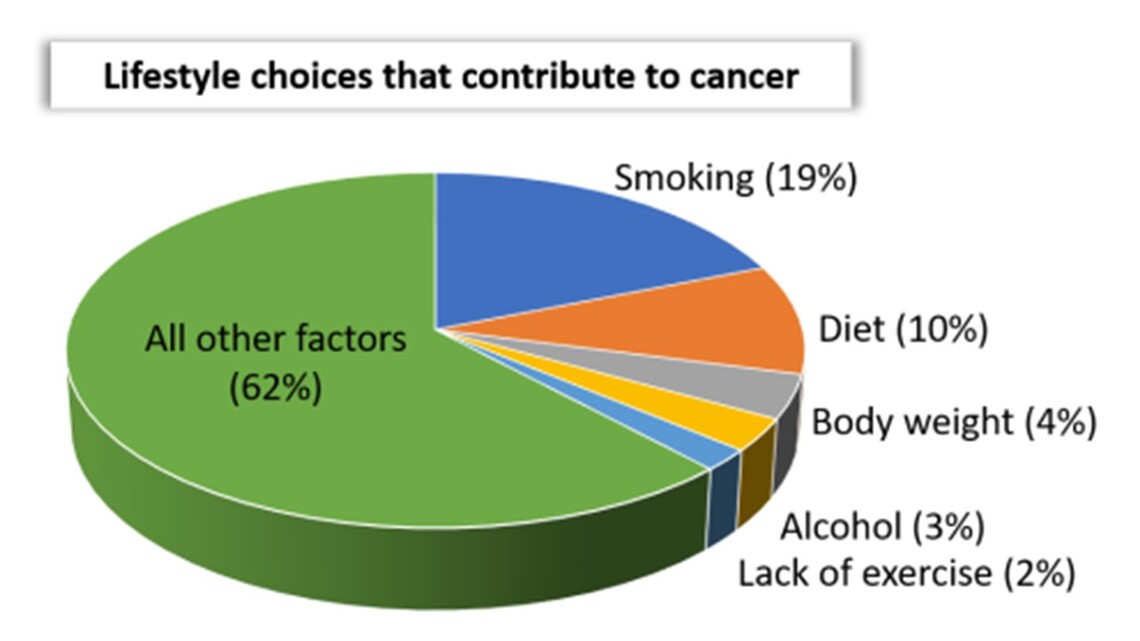- What are the most common types of cancer?
- Genes, ageing or lifestyle?
- Which lifestyle choices can reduce the risk of cancer?
- Breast cancer
- Bowel cancer (colorectal cancer)
- Lung cancer
- Prostate cancer
- The pros and cons of screening
What are the most common types of cancer?
In the UK, the four most common types of cancer are breast, bowel (colon), lung and prostate cancer.
Cancers can be caused by inherited faulty genes. Faulty genes cause an estimated 3–10% of all cancers.
Cancer Research UK advises that inherited faulty genes don’t mean you will definitely get cancer, but having faulty genes means that there is a higher risk of getting cancer. It is much more common for cancers to be caused by gene changes due to factors such as ageing, environment (e.g. air pollution, asbestos and UV radiation) and lifestyle.
Ageing is a major risk factor and unfortunately not one we can do much about. However, lifestyle is something we can control and is believed to account for about a third of cancer cases. For example, a Dutch study published in 2014 found that lifestyle risk factors contributed to an estimated:
- 30% of newly diagnosed cancer cases in adults
- 38% of cancer deaths.
Which lifestyle choices can reduce the risk of cancer?
There are five aspects of our lifestyle we can control and which research suggests can reduce the risk of cancer:
- Not smoking is a very important lifestyle choice. That’s because smoking is the single biggest cause of cancer, causing 15 different types of cancer, according to Cancer Research UK. It causes almost one in five cancer cases in the UK and more than a quarter of all cancer deaths. (Scroll down the page to find out more about how smoking and vaping increase the risk of lung cancer.)
- A Mediterranean diet (with plenty of vegetables, fruit, cereals, beans, nuts, seeds and olive oil) also seems to reduce the risk of cancer. A review of published research in 2017 found an association between following a Mediterranean diet and a lower risk of several types of cancer, in particular colon (bowel) cancer. Higher consumption of fruits, vegetables and whole grains appear to be the most beneficial foods.
Another 2017 review also found an association between healthy diets and a reduced risk of colon and breast cancer. However, the researchers noted that healthy dietary patterns were also associated with higher levels of education, physical activity and less smoking. This suggests that other aspects of a healthy lifestyle may have influenced the findings.
- Maintaining a healthy body weight also helps reduce the risk of cancer. Cancer Research UK reports that obesity is the second biggest preventable cause of cancer in the UK, with more than 1 in 20 cancer cases caused by excess weight. The more weight someone gains, and the longer they are overweight, the greater the risk of their developing cancer.
On the positive side, even small reductions in body weight make a real difference when they are maintained over time.
- Limiting alcohol consumption can also reduce the risk of a number of cancers, according to a World Cancer Research Fund study published in 2013. There is strong evidence that alcohol increases the risk of mouth, pharynx and larynx cancers, oesophageal cancer and breast cancer. In addition:
- two or more alcoholic drinks a day increases the risk of colon cancer
- three or more alcoholic drinks a day increases the risk of stomach cancer and liver cancer.
- Exercise: There is now convincing and strong evidence that regular physical activity reduces the risk of breast, colon and endometrial cancers and possibly also of lung, ovarian and prostate cancers. That’s according to a presentation at the 2016 American Association for Cancer Research conference.
As well as reducing the risk of cancer, regular exercise also helps recovery and survival rates among cancer patients, according to a review of research published in 2013.
Let’s look at the four most common cancers in a bit more detail:
Breast Cancer
Breast cancer is the most common type of cancer in women. The American Cancer Society reports that the risk of breast cancer is increased in particular by alcohol consumption. To a lesser extent, the risk of developing breast cancer is also increased by a number of other factors:
- a lack of physical activity
- not having children and not breastfeeding
- the use of oral contraceptives
- by being obese after the menopause
- undergoing combined hormone therapy (HRT) after the menopause.
Bowel cancer (colorectal cancer)
A healthy diet is particularly important for reducing the risk of developing colorectal cancer. Avoid eating too much red meat and processed meat, and instead, eat plenty of dietary fibre, particularly cereals and whole grains. Choose wholegrain or wholemeal varieties of starchy foods, such as brown rice, wholewheat pasta, and brown wholemeal or higher fibre white bread.
Also, taking regular exercise and maintaining a healthy weight both help reduce the risk of getting bowel cancer.
Lung cancer
Cancer Research UK reports that 72% of lung cancer cases in the UK are linked to exposure to tobacco smoke, 13% are linked to workplace exposures (in particular exposure to asbestos), and 8% are linked to air pollution – a total of 93%. The rest of the cases are linked to other causes.
The British Lung Foundation reports that an estimated 85% of lung cancer cases occur in people who smoke or used to smoke, with the risk increasing as smoking increases.
Two other risks are also linked to lung cancer:
- breathing in other people’s cigarette smoke over a long period of time (passive smoking)
- smoking e-cigarettes (vaping):Public Health England reported in 2015 that e-cigarettes are 95% less harmful for health than ordinary cigarettes, but this ‘doesn’t mean that vaping is safe’.
|
You can significantly reduce the risk of lung cancer by not smoking. The NHS provides information and resources if you want to stop smoking. |
Prostate Cancer
This is the most common cancer in men in the UK. Research has yet to establish clearly what can be done to reduce the risk of developing prostate cancer, although some research suggests that safe sexual activity, in particular frequent ejaculation, can reduce the risk. Unfortunately, this finding does not hold for the more serious types of prostate cancer.
The Mayo Clinic advises that there is no proven prostate cancer prevention strategy. It suggests, however, that you can reduce the risk of prostate cancer developing by making healthy lifestyle choices, such as exercising regularly and eating a healthy diet (low fat, with more fruit and vegetables and less dairy products).
The pros and cons of screening
In principle, screening can enable early detection of cancers, early treatment and therefore offer a better chance of survival.
However, some cancers are a greater risk to our health than others. In part this is because some cancers grow more quickly than others. Tumour grade (how abnormal tumour cells and tumour tissue look under a microscope) is one possible indicator of this risk. On the other hand, cancer can spontaneously go into remission and partially or completely disappear without treatment. Screening, therefore, isn’t always an exact science, and people can sometimes be treated unnecessarily with possible harmful side effects.
This helps explain the continuing controversy as to the value of mass screening for breast cancer. It also explains why some doctors are rethinking the effectiveness of PSA tests for prostate cancer. A 2020 article in the highly regarded journal Nature explains the pros and cons of screening in more detail.
However, if you are in a high-risk category, for instance where close members of your family have had this kind of cancer before the age of 40, then discuss screening with your doctor. Also, read the guidance:
- breast cancer: Families from Breast Cancer Care.
- prostate cancer: NHS PSA testing
Conclusions
- Breast, bowel, prostate and lung cancer are the most common cancers in the UK.
- A healthy lifestyle can reduce the risk of cancer by up to a third.
- Exercise, a healthy weight, a healthy diet and limited alcohol consumption all help reduce the risk of developing cancer.
- Not smoking is particularly important, especially for lung cancer.
- In addition, avoiding long-term use of HRT and oral contraceptives also helps reduce the risk of breast cancer.
- Frequent safe sex ejaculation may reduce the risk of prostate cancer.
- Eating less red and processed meat and more dietary fibre reduces the risk of bowel cancer.
- Mass screening has become more controversial, with arguments both for and against.
- However, if you are in a high-risk group then discuss screening with your doctor, if you haven’t already done so.
______________________________
Other relevant articles on the Age Watch website:
- Diet: Cruciferous vegetables - like kale, cabbage and broccoli
- Diet: Vegetarian diet
- Fitness: Can exercise help you survive cancer?
- Fitness: Exercise and live longer
- Age and gender: Women and smoking
- Tackling obesity: Obesity – Causes and consequences
Reviewed and updated in June 2020. Next review date May 2024.


